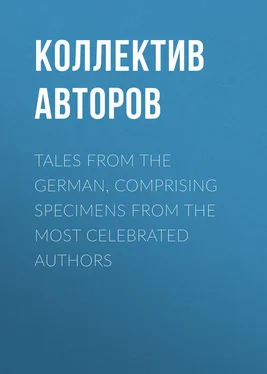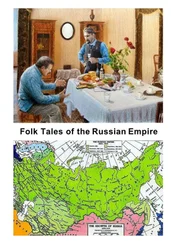Коллектив авторов - Tales from the German, Comprising specimens from the most celebrated authors
Здесь есть возможность читать онлайн «Коллектив авторов - Tales from the German, Comprising specimens from the most celebrated authors» — ознакомительный отрывок электронной книги совершенно бесплатно, а после прочтения отрывка купить полную версию. В некоторых случаях можно слушать аудио, скачать через торрент в формате fb2 и присутствует краткое содержание. Жанр: literature_18, foreign_antique, foreign_prose, Сказка, на английском языке. Описание произведения, (предисловие) а так же отзывы посетителей доступны на портале библиотеки ЛибКат.
- Название:Tales from the German, Comprising specimens from the most celebrated authors
- Автор:
- Жанр:
- Год:неизвестен
- ISBN:нет данных
- Рейтинг книги:4 / 5. Голосов: 1
-
Избранное:Добавить в избранное
- Отзывы:
-
Ваша оценка:
- 80
- 1
- 2
- 3
- 4
- 5
Tales from the German, Comprising specimens from the most celebrated authors: краткое содержание, описание и аннотация
Предлагаем к чтению аннотацию, описание, краткое содержание или предисловие (зависит от того, что написал сам автор книги «Tales from the German, Comprising specimens from the most celebrated authors»). Если вы не нашли необходимую информацию о книге — напишите в комментариях, мы постараемся отыскать её.
Tales from the German, Comprising specimens from the most celebrated authors — читать онлайн ознакомительный отрывок
Ниже представлен текст книги, разбитый по страницам. Система сохранения места последней прочитанной страницы, позволяет с удобством читать онлайн бесплатно книгу «Tales from the German, Comprising specimens from the most celebrated authors», без необходимости каждый раз заново искать на чём Вы остановились. Поставьте закладку, и сможете в любой момент перейти на страницу, на которой закончили чтение.
Интервал:
Закладка:
The hasty knight, Mizisla, measured the fruit-basket with his eyes – not the sense of the problem with his understanding – and said: "That which can be solved by the sword I will solve readily, but thy riddles, gracious princess, are rather too subtle for me. Nevertheless, in accordance with thy wishes, I will make a venture at random. I guess that if the plums be well counted, they will be found to amount to three score."
"Thou hast made a mistake, dear knight," answered the Lady Libussa. "If there were as many more, half as many more, and a third as many more, as the basket contains now and five more added to that, the number would by so much exceed three score as it is now short of it."
Prince Wladomir calculated slowly and laboriously, as if the post of general controller of the finances were the reward for solving the riddle, and at last gave out five-and-forty as the value of the renowned number. The lady then said:
"If there were a third as many more, half as many more, and a sixth as many more as there are now, there would then be in my basket as much more than forty-five as there now are under that number."
Although the very commonest hand at figures, would have deciphered the problem without trouble; nevertheless, for a bad calculation the gift of divination is absolutely indispensable, if he would come off with honour, and not appear ridiculous. Now as this gift had been fortunately communicated to the wise Premislas, it cost him neither ingenuity nor exertion to discover the solution of the riddle.
"Intimate associate of the heavenly powers," he said, "whoever undertakes to discover thy high-soaring and divine meaning, ventures to fly after the eagle, when he hides himself in the clouds. Nevertheless, I will follow thy secret flight as far as the eye, which is illumined by thee, can reach. I decide that the plums thou hast concealed in the basket are thirty in number, – neither more nor less."
The lady looked at him kindly and said; "Thou hast traced the glimmering spark that lies deep in the ashes, and light gleams upon thee out of mist and darkness; thou hast guessed my riddle."
She then opened the basket, counted out fifteen plums into Prince Wladomir's hat with one more, and there remained fourteen. Of these she gave seven to the Knight Mizisla with one more, and six remained in the basket. The half of these she awarded to the wise Premislas, then gave him the three others, and the basket was empty. The whole court was amazed at the arithmetical wisdom of the fair Libussa, and the acuteness of her clever bridegroom. No one could comprehend how human intellect was able on the one hand to bind a common number so enigmatically in words, and on the other to pick out such an ingenious mystery with such perfect confidence. The lady awarded the empty basket to the two knights, who could not obtain her love, as a memorial of a terminated amour. Hence arises the custom, which exists to the present time, of saying that a rejected lover has received a basket from his mistress. 7 7 The expression "Einen Korb bekommen," to meet with a refusal, is familiar to every reader of German.
When all was in readiness for the homage, and the nuptials, both these ceremonies were celebrated with great pomp. The Bohemian people had now a duke, and the fair Libussa a husband, both to their heart's content, and what was most surprising this result was brought about by trickery, which does not generally bear the reputation of being the most skilful negotiator. If one of the two parties had been deceived, certainly it was not the sage Libussa, but the people, as indeed is frequently the case. The land of Bohemia had nominally a duke, but in point of fact the government remained in a female hand as before. Premislas was a perfect pattern of a docile obedient husband, who did not dispute the rule of his wife, either in the household or the state. His thoughts and wishes sympathised as perfectly with her own, as two similarly tuned strings, of which the untouched one spontaneously repeats the sound, which the louder one has uttered. Libussa had not, however, the proud, vain disposition of those ladies who wish to pass for great matches, and are always superciliously reminding the poor wight, whose fortune they think they have made, of his wooden shoes; but she imitated the celebrated Queen of Palmyra, and governed by the superiority of her talents, as Zenobia managed her good-natured Odenatus.
The happy pair lived in the enjoyment of unchanging love, according to the fashion of that time, when the instinct which unites hearts was as firm and durable as the cement and mortar which renders the walls of the old world so firm and indestructible. Duke Premislas now became one of the most doughty knights of his age, and the Bohemian court one of the most brilliant in Germany. A large number of knights and nobles, as well as a great concourse of common people gradually assembled from all parts of the territory. The consequence was, that the court-city became too narrow for the inhabitants, and therefore Libussa called her people in office to her, and ordered them to build a city on the spot where they should find a man who knew how to make the wisest use of teeth at noon. They went out and found at the appointed time a man who was busied in sawing a block asunder. They decided that this industrious person made an incomparably better use of the teeth of his saw at noon than the parasite made of the teeth in his jaws at the table of the great, and they did not doubt that they had found the place which the princess had appointed for the foundation of the new city. They therefore drew the ploughshare round the field to mark the compass of the city wall. On asking the working man what he intended to make out of the piece of wood he was cutting, he answered: "Prah," which in the Bohemian tongue signifies the threshold of a door. Libussa therefore called the new city Praha, that is Prague, the well-known royal city on the Moldau in Bohemia. The prediction of Premislas concerning his posterity was punctually fulfilled. His wife became mother of three princes, two of whom died in their youth, while the third grew to man's estate, and from him sprung a brilliant race of kings, who flourished on the Bohemian throne for ages.
THE CRIMINAL FROM LOST HONOUR
In the whole history of man there is no chapter more instructive for the heart and mind than the annals of his errors. On the occasion of every great crime a proportionally great force was in motion. If by the pale light of ordinary emotions the play of the desiring faculty is concealed, in the situation of strong passion it becomes the more striking, the more colossal, the more audible, and the acute investigator of humanity, who knows how much may be properly set down to the account of the mechanism of the ordinary freedom of the will, and how far it is allowable to reason by analogy, will be able from this source to gather much fresh experience for his psychology, and to render it applicable to moral life.
The human heart is something so uniform and at the same time so compound! One and the same faculty or desire may play in a thousand forms and directions, may produce a thousand contradictory phenomena, may appear differently mingled in a thousand characters, and a thousand dissimilar characters and actions might be spun out of one kind of inclination, though the particular man, about whom the question was raised, might have no suspicion of such affinity. If, as for the other kingdoms of nature, a Linnæus for the human race were to arise, who could classify according to inclinations and impulses, how great would be the empire, when many a person whose vices are now stifled in a narrow social sphere, and in the close confines of the law, was found in the same order with the monster Borgia.
Читать дальшеИнтервал:
Закладка:
Похожие книги на «Tales from the German, Comprising specimens from the most celebrated authors»
Представляем Вашему вниманию похожие книги на «Tales from the German, Comprising specimens from the most celebrated authors» списком для выбора. Мы отобрали схожую по названию и смыслу литературу в надежде предоставить читателям больше вариантов отыскать новые, интересные, ещё непрочитанные произведения.
Обсуждение, отзывы о книге «Tales from the German, Comprising specimens from the most celebrated authors» и просто собственные мнения читателей. Оставьте ваши комментарии, напишите, что Вы думаете о произведении, его смысле или главных героях. Укажите что конкретно понравилось, а что нет, и почему Вы так считаете.












